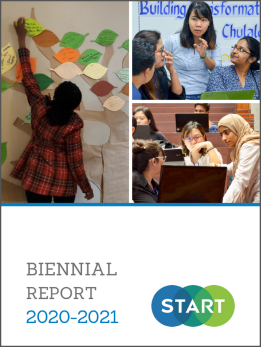“With this 2020-2021 biennial report, I am pleased to share news of START’s progress in the following areas:
Science leadership: Promoting science leadership has been an important element of START’s long-term impact through a multi-pronged approach of new skills, integrated knowledge, and greater connectivity. During this period, we significantly increased our work in science leadership, offering a virtual science leadership training course for the African Academy of Sciences and a virtual reflexive learning in leadership opportunity for West African researchers. Going forward, we plan to continue building our science leadership offerings in West Africa and beyond, with an emphasis on building internal leadership competencies for doing effective transdisciplinary research in complex situations.
Science-society engagement: START’s programs strongly emphasize the strengthening of skills and experiential confidence of researchers working with communities. During this period, we supported virtual efforts by researchers and university faculty to engage local governments and communities in Africa and Asia to better address place-based adaptation and climate resilience challenges. We also continued to offer opportunities to strengthen transdisciplinary capabilities related to research on adaptation and resilience.
Online learning: Recognizing that the pandemic response has accelerated trends towards online learning, START is in the process of developing virtual learning resources in the areas of science leadership, science writing, and proposal development skills. These virtual learning resources are being directed towards early- and mid-career researchers and sustainability professionals in Africa and Asia and will feature a combination of synchronous and asynchronous engagement.
We are very grateful for the support we received during the 2020-2021 period from the US Global Change Research Program (from which START receives core funding) as well as from the National Science Foundation, the National Aeronautics and Space Agency, the International Development Research Centre of Canada, the Research Fund of Quebec, the UK Foreign Commonwealth and Development Office, the UK Natural Environment Research Council, the UN Environment Programme, and the African Academy of Sciences. We are also very grateful for our strong partnerships with numerous universities, research centers, NGOs and government agencies in Africa, Asia, and elsewhere–partnerships through which START is able to achieve lasting impact.”
Jon Padgham, START’s Executive Director



